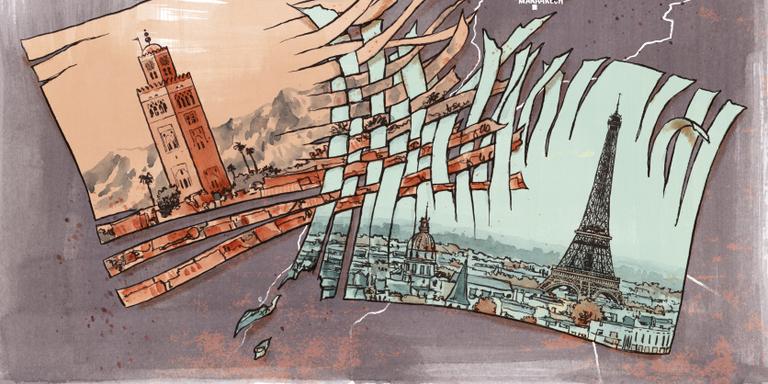


France and Morocco's political and social networks are fading
News'France and Morocco: Wounds of the heart' (2/3). Although the kingdom continues to enjoy political and media support in France, the tensions of recent years have revealed the exhaustion of the special bond forged over decades between Paris and Rabat.
"Our hearts are with Morocco." On one warm Parisian autumn night, these letters were lit up on the façade of Paris' Arab World Institute on September 9. They were a show of incandescent compassion on the banks of the Seine, described as an "outpouring of affection" for the "friendly people" of Morocco according to Jack Lang, President of the Institute, the day after the earthquake that devastated the High Atlas region near Marrakech. Lang, like many others, such as French intellectual Bernard-Henri Lévy, Moroccan actor Gad Elmaleh, politicians Rachida Dati, Nicolas Sarkozy, Dominique de Villepin, Dominique Strauss-Kahn and Moroccan writer Tahar Ben Jelloun, all of whom are of either Moroccan origin or friends of Morocco, showed their solidarity with the Moroccans in mourning in French media.
Above all, they denied any controversy regarding the delivery of relief supplies or Rabat's refusal to accept Paris's offer of assistance – mostly to diffuse questions.
Beyond a more than natural sympathy for the tragedy, the High Atlas earthquake confirmed the permanence in France of a real political, economic and cultural network, benevolent towards Morocco's officials: "Mohammed VI is a very great leader," said Sarkozy on September 13, on BFM-TV; "Mohammed VI acted with appropriate speed," according to Lévy, in weekly Le Point, September 14. However, this wave of support has not extended, or no longer extends, to the topmost echelon of the French government.
It has failed to prevent the outbreak of a serious crisis between the two countries. French President Emmanuel Macron and King Mohammed VI rarely speak to each other anymore. The president's announced visit to Morocco has been postponed indefinitely, and in Rabat, the press close to the regime attacks the French president daily with a rare virulence.
The political schism between the two capitals, strangely aggravated by the earthquake, has revealed the extent of influence strategies hitherto deployed by the kingdom with the French political and media class. It's as though something has broken. Long gone are the days when former French president Jacques Chirac (1932-2019) lavished an almost familial solicitude on the young King Mohammed VI, enthroned in July 1999. Before passing away, his father, Hassan II (1929-1999), had asked Chirac, who had always consulted him on Arab world affairs, to watch over the heir to the throne, according to Jean-Pierre Tuquoi, a former journalist with Le Monde, in his book Majesté, Je Dois Beaucoup à Votre Père : France-Maroc, Une Histoire de Famille ("Majesty, I Owe a Lot to Your Father: France-Morocco, A Family History," 2006). We were still in the warm complicity inherited from "Françafrique," a term used for France's foreign policy relations toward its former colonies.
You have 80.94% of this article left to read. The rest is for subscribers only.
